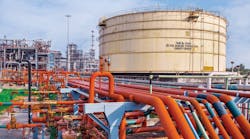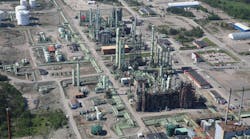By the OGJ Online Staff
HOUSTON, Mar. 21�The oil and natural gas industry is working toward developing a form of gasoline that could power fuel cell cars, Red Cavaney, American Petroleum Institute president and CEO, said Wednesday.
Hydrogen and methanol are competing options for rapidly advancing fuel cell technology, but both appear less suited for the nearer term marketplace than technology fueled by gasoline, Caveney told a Hart World Fuels Conference meeting in New Orleans.
Vehicles driven by future generations "may well be propelled by something other than the internal combustion engine, most likely power based on fuel cell technology," he said.
Companies within the petroleum industry are working in partnerships with automobile industry counterparts to develop and adapt fuel cells for highway vehicles, he said.
"In our industry�s vision, an advanced gasoline provided by our industry is the fuel of choice," Cavaney said. "Our evolving new fuels will be the stepping-stones to the next generation of gasoline that we hope will serve as the feedstock for fuel cell-powered vehicles."
Cavaney said numerous reasons exist to believe fuel cell technology will achieve commercial viability within a decade. Prototype fuel cell vehicles are being pilot-tested in California.
"Moreover, if our industry does its part in meeting the challenge, gasoline will be very well positioned to be the fuel of choice," he said. "Fuel cell technology holds tremendous promise for the environment. It will dramatically reduce conventional pollutants, as well as other emissions, making it an enormously important tool for continuing our environmental progress."
Although the cost of fuel cells is high now, Cavaney said he expects the cost will become competitive with further technology development and the mass production of vehicles.
"Many feel hydrogen is the ultimate fuel cell option, but hydrogen technology is now far costlier and not as far along as other potential approaches. Methanol is a nearer-term possibility, yet it must overcome formidable challenges relating to health, safety, and vehicle range. Methanol also lacks a distribution infrastructure, such as exists for gasoline," he said.
Distribution infrastructure is critical because using gasoline's existing infrastructure greatly reduces investment, reduces the time for implementation, and will help ensure consumer acceptance and support, he said.
"Being able to continue to use a form of gasoline is a big plus. Finding it at the same convenient locations is also a plus and should help speed the embrace of the new technology," Cavaney said.

